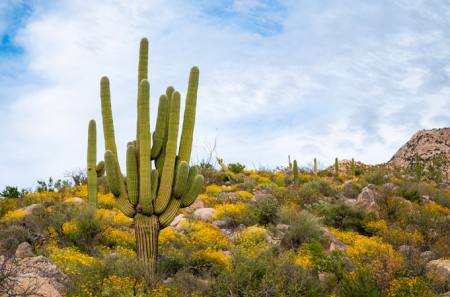The challah is gone. The babka has vanished from the display. All that's left in the central glass case is empty tins, their paper blotted with leaked butter, a memory of almond croissants.
This is how the days go at Lior the Baker in north Scottsdale. Lior and Lily Ben-Shushan, a husband-and-wife team from Israel, bake some of the best pastries in Arizona. But to taste them you may have to show up early. Five years into the business, the word is out. The couple often sells out of nearly everything before noon.
And so on a winter day at 11 o'clock in the morning, in a strip mall in the northern Sonoran Desert, Lior sells a few final rugelach to a college student. For a regular in a business suit, he warms a flat, chewy Moroccan bread that has been cooked on river stones and covered with z’atar. Just two flatbreads remain.
In the kitchen, a timer beeps. Lior strolls to the oven, removes a tray of puffy almond croissants and sets them aside to cool.
"The almond croissant—people come from all over for the almond croissant," Lior says. "People from France even. People from Chicago. People from Tucson."
Lior bakes challah in flavors like almond and halvah (sesame seeds and vanilla). His babka takes three days from start to finish and includes an overnight fermentation.
In 2018, Lior began shipping to his customers from beyond Arizona. "We started shipping nationwide," he says. "We've become very popular in New York. Today, we have the ability to ship fresh."
From Africa to Arizona: Zemam's Restaurant
In Tucson, global chefs are expanding Arizona's gastronomic footprint in the same way as Lior and Lily.
For 25 years, Amanuel Gebremariam has been plating Ethiopian food to the crowds at his restaurant, Zemam's. Four decades ago, he fled his native Ethiopia as a refugee rather than join the country's ruling or insurgent parties. ("I fled because I wanted a peaceful night's sleep, without being hustled and without being interrogated," he says.) After a stop in Washington D.C. and a government job in Mauritania, Gebremariam moved to Arizona and soon turned his life focus to his ancestral foods.
Ethiopian cuisine is founded on injera, a fermented bread with a tang that adds a slight tartness to counter thick stews. Gebremariam makes his from teff, an Ethiopian highland grain.
Gebremariam learned to cook from watching his mom, and many of his dishes are hers, produced in the traditional way.
"In places like Tucson, the temperature is warm and injera takes 12 to 14 hours to ferment," he says. "In cold areas, it takes three days."
From a small restaurant with just four tables to two lively locations, Zemam's continues to satisfy diners with meals centered around great, spongy discs of flatbread coated with a near-rainbow of preparations: collard greens with cayenne and coriander; red lentils tinged with berbere; smashed yellow chickpeas with onions and peppers; doro wat, his specialty, chicken thighs and drumsticks seasoned with lemon overnight and stewed with spices and allium.
Jamaican cuisine in the desert: D's Island Grill
Also in Tucson, but a little north of Zemam's and closer to the Rillito River, Duwayne Hall runs D's Island Grill. Its modest dining room has 28 seats and banana-yellow walls that carry you away to the tropics.
"When you come in, it's a good vibe," Hall says. "Sometimes we play a little gospel. Sometimes we play old-school reggae."
Like Gebremariam, Hall got his start with his mom, helping her cook for his younger siblings growing up in St. Thomas, Jamaica. In 2001, he followed a girl to Arizona.
"There was a need for Jamaican food, so I decided to pursue it from a truck," he says.
Classic Jamaican dishes fill the menu, with jerk chicken leading the way thanks to Hall's housemade jerk sauce. ("The way we do it here is the authentic way," he says. "We have a charcoal grill, and we cook the chicken on that. It's one of our popular dishes.") Other dishes include beef patties, goat curry, fried plantains.
The festival bread at D's also has a cult following. Some customers come in just for the tiny sweet loaves, scented with nutmeg and cinnamon. A current of tropical heat runs through dishes like braised oxtail, though Hall keeps the spice in check.
"We try to make it not too spicy," he says. "We have Scotch bonnets in the bottle, so if somebody wants it hotter, they can put more on. The Scotch bonnet is a Jamaican tradition. The natural seasoning in that pepper goes with anything."
'Where there are small details, there is God'
Maybe you wouldn't expect to find babka in Arizona. Or doro wat. Or braised oxtail with Scotch bonnet peppers.
But finding such dishes is almost as rewarding as eating them. Because, almost always, they are created by people who want to honor their homelands and do right by the parents and grandparents who taught them to love food.
Hall shows care for his food traditions, as far removed from their origins as they are. The same can be said of Lior Ben-Shushan. During a rare pre-lunch lull, Lior checks his almond croissants, cooling on a side table. Their exteriors look as intricate as clamshells.
"Where there are small details," Lior says, "there is God."
Sugar and almond coating the tops, Lior's croissants absorb a few quick sprays from a water bottle. Their sweet yeasty smell permeates. He returns them to the oven and walks back to the counter, where he awaits the next customer, who, though late and facing limited options, will be eating well anyway.





